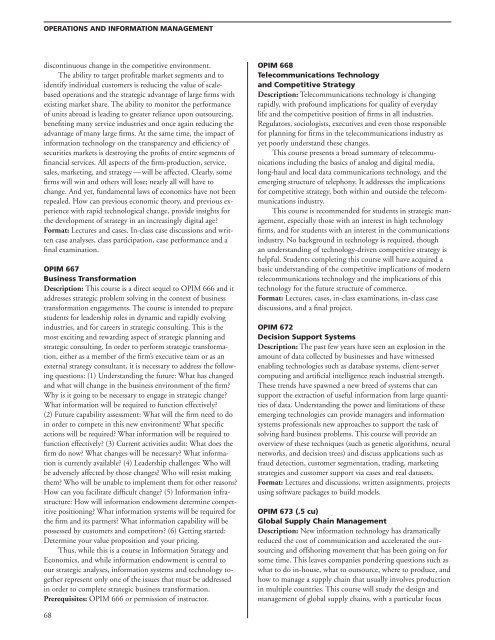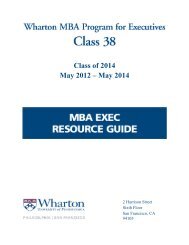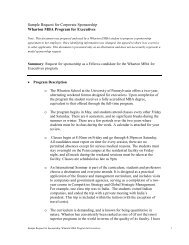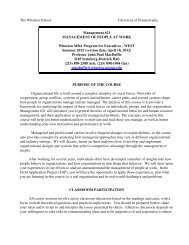Explore Options; Plan Your MBA Academic Program
Explore Options; Plan Your MBA Academic Program
Explore Options; Plan Your MBA Academic Program
Create successful ePaper yourself
Turn your PDF publications into a flip-book with our unique Google optimized e-Paper software.
OPERATIONS AND INFORMATION MANAGEMENT<br />
discontinuous change in the competitive environment.<br />
The ability to target profitable market segments and to<br />
identify individual customers is reducing the value of scalebased<br />
operations and the strategic advantage of large firms with<br />
existing market share. The ability to monitor the performance<br />
of units abroad is leading to greater reliance upon outsourcing,<br />
benefiting many service industries and once again reducing the<br />
advantage of many large firms. At the same time, the impact of<br />
information technology on the transparency and efficiency of<br />
securities markets is destroying the profits of entire segments of<br />
financial services. All aspects of the firm-production, service,<br />
sales, marketing, and strategy — will be affected. Clearly, some<br />
firms will win and others will lose; nearly all will have to<br />
change. And yet, fundamental laws of economics have not been<br />
repealed. How can previous economic theory, and previous experience<br />
with rapid technological change, provide insights for<br />
the development of strategy in an increasingly digital age?<br />
Format: Lectures and cases. In-class case discussions and written<br />
case analyses, class participation, case performance and a<br />
final examination.<br />
OPIM 667<br />
Business Transformation<br />
Description: This course is a direct sequel to OPIM 666 and it<br />
addresses strategic problem solving in the context of business<br />
transformation engagements. The course is intended to prepare<br />
students for leadership roles in dynamic and rapidly evolving<br />
industries, and for careers in strategic consulting. This is the<br />
most exciting and rewarding aspect of strategic planning and<br />
strategic consulting. In order to perform strategic transformation,<br />
either as a member of the firm’s executive team or as an<br />
external strategy consultant, it is necessary to address the following<br />
questions: (1) Understanding the future: What has changed<br />
and what will change in the business environment of the firm?<br />
Why is it going to be necessary to engage in strategic change?<br />
What information will be required to function effectively?<br />
(2) Future capability assessment: What will the firm need to do<br />
in order to compete in this new environment? What specific<br />
actions will be required? What information will be required to<br />
function effectively? (3) Current activities audit: What does the<br />
firm do now? What changes will be necessary? What information<br />
is currently available? (4) Leadership challenges: Who will<br />
be adversely affected by those changes? Who will resist making<br />
them? Who will be unable to implement them for other reasons?<br />
How can you facilitate difficult change? (5) Information infrastructure:<br />
How will information endowment determine competitive<br />
positioning? What information systems will be required for<br />
the firm and its partners? What information capability will be<br />
possessed by customers and competitors? (6) Getting started:<br />
Determine your value proposition and your pricing.<br />
Thus, while this is a course in Information Strategy and<br />
Economics, and while information endowment is central to<br />
our strategic analyses, information systems and technology together<br />
represent only one of the issues that must be addressed<br />
in order to complete strategic business transformation.<br />
Prerequisites: OPIM 666 or permission of instructor.<br />
68<br />
OPIM 668<br />
Telecommunications Technology<br />
and Competitive Strategy<br />
Description: Telecommunications technology is changing<br />
rapidly, with profound implications for quality of everyday<br />
life and the competitive position of firms in all industries.<br />
Regulators, sociologists, executives and even those responsible<br />
for planning for firms in the telecommunications industry as<br />
yet poorly understand these changes.<br />
This course presents a broad summary of telecommunications<br />
including the basics of analog and digital media,<br />
long-haul and local data communications technology, and the<br />
emerging structure of telephony. It addresses the implications<br />
for competitive strategy, both within and outside the telecommunications<br />
industry.<br />
This course is recommended for students in strategic management,<br />
especially those with an interest in high technology<br />
firms, and for students with an interest in the communications<br />
industry. No background in technology is required, though<br />
an understanding of technology-driven competitive strategy is<br />
helpful. Students completing this course will have acquired a<br />
basic understanding of the competitive implications of modern<br />
telecommunications technology and the implications of this<br />
technology for the future structure of commerce.<br />
Format: Lectures, cases, in-class examinations, in-class case<br />
discussions, and a final project.<br />
OPIM 672<br />
Decision Support Systems<br />
Description: The past few years have seen an explosion in the<br />
amount of data collected by businesses and have witnessed<br />
enabling technologies such as database systems, client-server<br />
computing and artificial intelligence reach industrial strength.<br />
These trends have spawned a new breed of systems that can<br />
support the extraction of useful information from large quantities<br />
of data. Understanding the power and limitations of these<br />
emerging technologies can provide managers and information<br />
systems professionals new approaches to support the task of<br />
solving hard business problems. This course will provide an<br />
overview of these techniques (such as genetic algorithms, neural<br />
networks, and decision trees) and discuss applications such as<br />
fraud detection, customer segmentation, trading, marketing<br />
strategies and customer support via cases and real datasets.<br />
Format: Lectures and discussions, written assignments, projects<br />
using software packages to build models.<br />
OPIM 673 (.5 cu)<br />
Global Supply Chain Management<br />
Description: New information technology has dramatically<br />
reduced the cost of communication and accelerated the outsourcing<br />
and offshoring movement that has been going on for<br />
some time. This leaves companies pondering questions such as<br />
what to do in-house, what to outsource, where to produce, and<br />
how to manage a supply chain that usually involves production<br />
in multiple countries. This course will study the design and<br />
management of global supply chains, with a particular focus

















